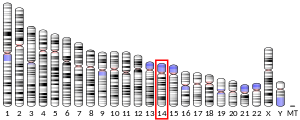Dishevelled binding antagonist of beta catenin 1 (Dact1, previously known as Dapper, Dpr1, Frodo) is a protein that in humans is encoded by the DACT1 gene.[5] Dact1 was originally described in 2002 as a negative regulator of Wnt signaling by binding and destabilizing Dishevelled.[6] More recent investigation into the molecular function of Dact1 has identified its principle role in the cell as a scaffold to generate membrane-less biomolecular condensates through liquid-liquid phase separation.[7] Mutations in the phase-separating regions of Dact1 lead to Townes-Brock Syndrome 2 while its overexpression is associated with bone metastasis.[7]
This article may be too technical for most readers to understand. (March 2022) |

Regulation and function
editDact1 is regulated by the TGF-β pathway through Smad2/Smad3 binding sites in its promoter region.[8] Dact1 is degraded through the proteasome[7] and is described as a Wnt activator,[9] a Wnt suppressor,[6] or alternately a Wnt-independent regulator of the autophagosome.[10] The Dact1 protein is annotated with 10 intrinsically disordered domains, a nuclear localization sequence, a nuclear export sequence, a PDZ binding domain, and a coiled-coiled domain.[7] AI-based protein folding predictions describe a highly disordered exterior calyx surrounding an ordered interior.[11] Dact1 has been reported to interact with numerous proteins including itself, Dishevelled, p120, LEF, 14-3-3 proteins, Vps34, Miz1, Vangl, and Dact2 through immunoprecipitation studies.[12][13][14][15][16] More recent studies into the role of Dact1 in forming "Frodosomes",[17][7] or membrane-less, organelle-like biomolecular condensates, identified a Dact1 protein signature that included many previously identified interactors as well as new proteins such as Casein Kinase 2.[18][7]
Health and disease
editDact1 is an essential regulator of development through its role in regulating Wnt activity and its deletion is embryonically lethal. Heterozygous mutations in Dact1 cause Townes-Brock Syndrome 2 in humans which is inherited in an autosomal dominant pattern.[19] High levels of Dact1 mRNA predicts worse outcome in breast cancer bone metastasis and is an essential protein in the bone metastatic cascade.[7]
References
edit- ^ a b c GRCh38: Ensembl release 89: ENSG00000165617 – Ensembl, May 2017
- ^ a b c GRCm38: Ensembl release 89: ENSMUSG00000044548 – Ensembl, May 2017
- ^ "Human PubMed Reference:". National Center for Biotechnology Information, U.S. National Library of Medicine.
- ^ "Mouse PubMed Reference:". National Center for Biotechnology Information, U.S. National Library of Medicine.
- ^ "DACT1 dishevelled binding antagonist of beta catenin 1 [Homo sapiens (human)] - Gene - NCBI". www.ncbi.nlm.nih.gov. Retrieved 2021-11-30.
- ^ a b Cheyette BN, Waxman JS, Miller JR, Takemaru K, Sheldahl LC, Khlebtsova N, et al. (April 2002). "Dapper, a Dishevelled-associated antagonist of beta-catenin and JNK signaling, is required for notochord formation". Developmental Cell. 2 (4): 449–461. doi:10.1016/S1534-5807(02)00140-5. PMID 11970895.
- ^ a b c d e f g Esposito M, Fang C, Cook KC, Park N, Wei Y, Spadazzi C, et al. (March 2021). "TGF-β-induced DACT1 biomolecular condensates repress Wnt signalling to promote bone metastasis". Nature Cell Biology. 23 (3): 257–267. doi:10.1038/s41556-021-00641-w. PMC 7970447. PMID 33723425.
- ^ Koinuma D, Tsutsumi S, Kamimura N, Taniguchi H, Miyazawa K, Sunamura M, et al. (January 2009). "Chromatin immunoprecipitation on microarray analysis of Smad2/3 binding sites reveals roles of ETS1 and TFAP2A in transforming growth factor beta signaling". Molecular and Cellular Biology. 29 (1): 172–186. doi:10.1128/MCB.01038-08. PMC 2612478. PMID 18955504.
- ^ Huang Y, Wang P, Chen H, Ding Y, Chen YG (March 2015). "Myc-interacting zinc-finger protein 1 positively regulates Wnt signalling by protecting Dishevelled from Dapper1-mediated degradation". The Biochemical Journal. 466 (3): 499–509. doi:10.1042/BJ20141143. PMID 25558878.
- ^ Ma B, Cao W, Li W, Gao C, Qi Z, Zhao Y, et al. (August 2014). "Dapper1 promotes autophagy by enhancing the Beclin1-Vps34-Atg14L complex formation". Cell Research. 24 (8): 912–924. doi:10.1038/cr.2014.84. PMC 4123296. PMID 24980960.
- ^ "AlphaFold Protein Structure Database". alphafold.ebi.ac.uk. Retrieved 2021-11-30.
- ^ Park JI, Ji H, Jun S, Gu D, Hikasa H, Li L, et al. (November 2006). "Frodo links Dishevelled to the p120-catenin/Kaiso pathway: distinct catenin subfamilies promote Wnt signals". Developmental Cell. 11 (5): 683–695. doi:10.1016/j.devcel.2006.09.022. PMID 17084360.
- ^ Zhang L, Gao X, Wen J, Ning Y, Chen YG (March 2006). "Dapper 1 antagonizes Wnt signaling by promoting dishevelled degradation". The Journal of Biological Chemistry. 281 (13): 8607–8612. doi:10.1074/jbc.M600274200. PMID 16446366.
- ^ Gao X, Wen J, Zhang L, Li X, Ning Y, Meng A, et al. (December 2008). "Dapper1 is a nucleocytoplasmic shuttling protein that negatively modulates Wnt signaling in the nucleus". The Journal of Biological Chemistry. 283 (51): 35679–35688. doi:10.1074/jbc.M804088200. PMID 18936100.
- ^ Chen H, Liu L, Ma B, Ma TM, Hou JJ, Xie GM, et al. (April 2011). "Protein kinase A-mediated 14-3-3 association impedes human Dapper1 to promote dishevelled degradation". The Journal of Biological Chemistry. 286 (17): 14870–14880. doi:10.1074/jbc.M110.211607. PMC 3083226. PMID 21262972.
- ^ Kivimäe S, Yang XY, Cheyette BN (June 2011). "All Dact (Dapper/Frodo) scaffold proteins dimerize and exhibit conserved interactions with Vangl, Dvl, and serine/threonine kinases". BMC Biochemistry. 12: 33. doi:10.1186/1471-2091-12-33. PMC 3141656. PMID 21718540.
- ^ Saplakoglu Y (2021-03-24). "Meet the 'frodosome,' a brand new organelle". livescience.com. Retrieved 2021-12-01.
- ^ Yu C, Lang Y, Hou C, Yang E, Ren X, Li T (January 2022). "Distinctive Network Topology of Phase-Separated Proteins in Human Interactome". Journal of Molecular Biology. 434 (1): 167292. doi:10.1016/j.jmb.2021.167292. PMID 34624295. S2CID 238529546.
- ^ "OMIM Entry - # 617466 - TOWNES-BROCKS SYNDROME 2; TBS2". omim.org. Retrieved 2021-12-01.



